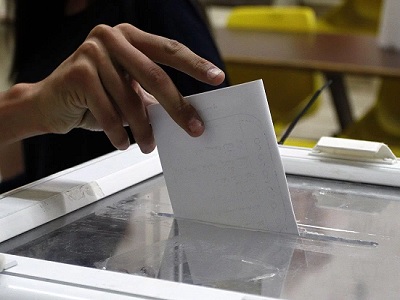
By Yousef M. Aljamal
As various Palestinian political factions are busy preparing for their electoral lists to join the upcoming local elections to be held in October 2016 in the West Bank and the Gaza Strip, the Palestine Chronicle spoke to young Palestinians regarding this process, their aspirations and expectations.
The majority of political factions in the West Bank and Gaza Strip announced their plans to participate in the elections.
The previous general elections had seen poor participation from the youth in terms of nomination and playing a role in Palestinian politics, and it appears that this trend has not changed with regards to the present election.
Ghada Abukarsh, 22, a graduate of English Literature from Alazhar University said she would participate in the local elections by voting for technocrats and professionals rather than people affiliated with factions.
She noted: “Elections would serve as a good opportunity for young people to bring about change,” adding, that it “would be of immense importance to support young people in the elections because they suffered the most and they can solve the problems they faced.”
The Ramallah-based journalist, Ameer Aboiram, 25, said that he will also be voting, stating that there are two aspects to his decision: “The first is the services part and the other is the political part. Being from the West Bank, I have seen that some people who were in charge of local councils mismanaged the work and made the situation of the population worse, thus we have to bring about change.”
Aboirman noted that local elections would give “an idea about the popularity of each faction and those people who hindered the general election in the future would be exposed.”
In contrast, Haitham Shuhaiber, 28, a teacher based in Gaza believes that “local elections are ink on paper and will not change anything because I have seen over the course of the years the lack of good intentions among various Palestinian parties.”
He added, “Parties blame each other and forget the fact that their people are suffering and want to live in dignity and freedom.” However, he indicated that he still has “hopes that they (political parties) will eventually have good intentions.”
The Gaza Strip has been suffering from multiple crises throughout the past few years. Electricity outages and the lack of clean water has made the situation for Gazans miserable. The two major political factions, Fatah and Hamas, have blamed each other for the continuing crisis. Some cities in the West Bank have experienced electricity and water cuts in the last few years which are less severe than those that of Gaza.
Many Palestinians hope that the upcoming elections would bring about a change in their circumstances.
Nour Abu Aisha, 26, a Gaza-based journalist believes that local Palestinian elections would benefit the Gaza Strip the most “because regional powers want the situation here to stabilize in addition there is a popular demand for improving the situation.”
Abu Aisha believes that Fatah would win local elections in the Gaza Strip, which will help ease the siege, and improve services, but Hamas “would still be in power.”
She added, “Israel is interested in calm in the Gaza Strip and because they agreed to allow the payment of salaries to civil servants, it will allow for elections to happen.”
The Palestinian Central Elections Commission said there are 416 local councils in the West Bank and the Gaza Strip, of which only 25 are in the Gaza Strip, which is home to nearly 1.9 Million Palestinians. Palestinian refugee camps in the West Bank have traditionally refrained from participating in the local elections since 1997, in order to assert refugees’ right of return.
The elections will be based on electoral lists from which voters will select for a candidate one. Voting for nominees individually will not be allowed as this will further factionalize the electoral process.
Fady Alashram, 30, believes that “Hamas was not given a chance previously,” adding that for local elections to be successful, “parliamentary and presidential elections must be held first, because Hamas can’t control local councils in the West Bank and Fatah can’t control local councils in the Gaza Strip.”
Alashram concluded that “most young people are frustrated by Palestinian domestic politics which makes them hesitant to participate.”
Palestinians agree that as long as their country is occupied with Israel having the last say, and as long as the major Palestinian factions continue to have disagreements, the services provided to them will not improve. Only a real and tangible change could make Palestinians feel less frustrated.
– Yousef M. Aljamal is the correspondent of the Palestine Chronicle in the Gaza Strip.




